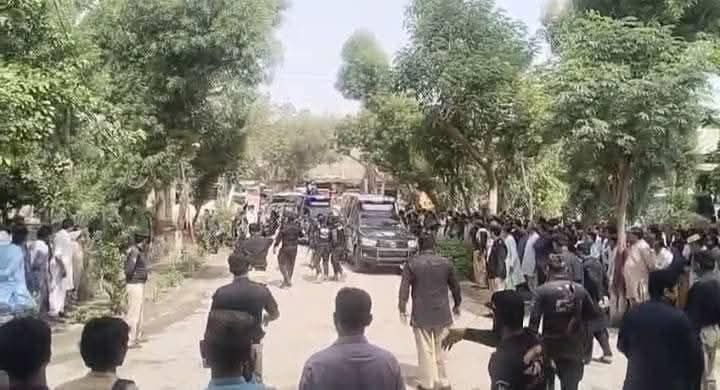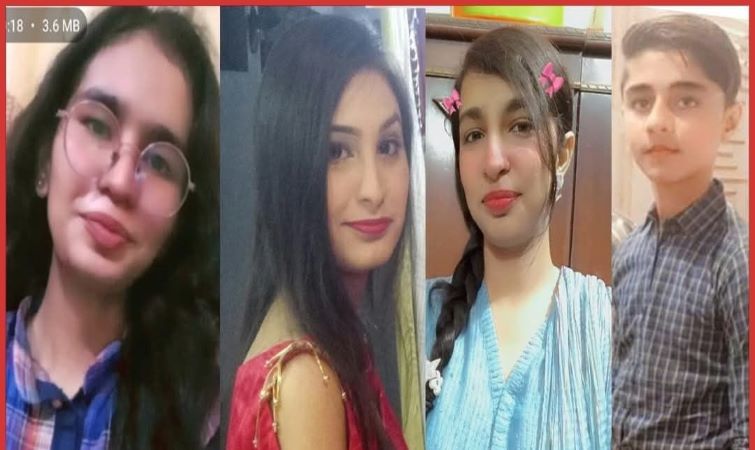Forced Conversions Continue in Pakistan

By Nasir Aijaz
The AsiaN Representative
KARACHI: The recent abduction and forced conversion of three daughters and a son of a Hindu family in Shahdadpur, a city of southern Sindh province of Pakistan, has once again brought the alarming issue of religious forced conversions into the spotlight.
According to the allegations made by the mother, a member of the Hindu community, the minors – Diya Bai, Jia Bai, Disha Bai and their brother Honey Kumar, were abducted and converted under duress, with their minor son publicly claiming he was converted at gunpoint.
Despite legislative efforts, such incidents highlight the ongoing failure of authorities to protect minority communities against heinous crimes, raising urgent calls for accountability and stricter enforcement.
Although the police have arrested the accused, a teacher, who used to take tuition classes, the abducted children were not handed back to their parents, and instead sent to a government Shelter Home, as reported on the social media.
The girls and their brother were recovered by the police from Karachi, the provincial capital. According to latest reports, they were produced in a local court on Friday, but strangely the court allowed the minor boy Honey Kumar and Disha Bai to go with their parents while two elder girls Dia Bai and Jia Bai were refused to be handed over to the parents and were sent to Shelter home. Nobody knows their fate. The parents and the members of Hindu community staged protest demonstrations but their protest remained unheeded.
Sindh, a province historically known for its religious diversity and pluralism, has seen a troubling rise in reports of forced conversions of minority women and children. Human rights organizations and minority advocacy groups repeatedly raise concerns that religious minorities, including Hindus, Christians, and others, are increasingly vulnerable to abductions, forced conversions, and marriages against their will.
The issue is multifaceted, rooted in socio-economic marginalization, social pressures, and sometimes entangled with political and criminal syndicates. The perpetrators often operate under the guise of religious or social norms, exploiting legal loopholes and societal indifference.
Many of these incidents follow eerily similar patterns. In some cases, families have reported their daughters disappearing without trace, only to find them later converted and married, sometimes after police or local officials dismiss claims of coercion.
Such cases often evoke protests, legal battles, and media coverage, but despite the efforts, justice remains elusive for many victims. One prominent example was in 2019 when Rinkle Kumari, a young Hindu girl, was abducted and reportedly converted. Her case garnered national and international attention, sparking protests and demands for action, but critics argued that the existing legal framework was inadequate to protect minors from abduction and forced conversion in a timely manner.
Many cases involve minors as young as 12 or 13, highlighting how vulnerable this segment of society is to exploitation. Reports from Tharparkar, Kandhkot, and other districts have consistently painted a grim picture of women and children being abducted, their right to choose forcibly denied, often under societal pressures or threats. Despite the repeated exposure of these incidents, many argue that the authorities’ response remains weak.
Laws such as the Sindh Criminal Law (Protection of Minorities) Bill, which criminalizes abduction and forced conversion, have been enacted, but their enforcement is often criticized as being ineffective. Some officials are accused of turning a blind eye or even colluding with perpetrators, further marginalizing already vulnerable communities.
Many families have openly accused local authorities and police officials of either turning a blind eye or actively participating in such crimes, citing a lack of accountability. A 2022 report by the Human Rights Watch indicated that courts have sometimes validated marriages forcibly entered by minors, citing notions of “consent” that are often coerced or manipulated. This disconnect between law and practice perpetuates a cycle of impunity which leaves vulnerable minorities in helpless situations.
Statistics provided by the All Pakistan Minority Alliance reveal that approximately 80% of reported abduction and forced conversion cases go unresolved or are dismissed due to lack of evidence or miscarriage of justice.
The NGOs also highlight that actual figures could be much higher, as many families fear retaliation and choose not to report incidents. For example, in the year 2021 alone, over 100 cases of Hindu girls being abducted and forcibly converted were officially reported in Sindh, but local sources estimate that the real number could be double or triple that. Such statistics underscore the severity of the crisis and reflect a systemic failure to stem the tide of violence against religious minorities.
The emotional toll is devastating. Victims often find themselves entirely powerless in courts that are slow to act or sympathetic to the accused. The abduction, coercion, and conversion of minors are often cloaked in societal acceptance or silence, making it difficult to combat this phenomenon effectively. High-profile cases have brought international attention, but concrete change remains elusive.
Many of these incidents follow eerily similar patterns. In some cases, families have reported their daughters disappearing without trace, only to find them later converted and married, sometimes after police or local officials dismiss claims of coercion.
Such cases often evoke protests, legal battles, and media coverage, but despite the efforts, justice remains elusive for many victims. One prominent example was in 2019 when Rinkle Kumari, a young Hindu girl, was abducted and reportedly converted. Her case garnered national and international attention, sparking protests and demands for action, but critics argued that the existing legal framework was inadequate to protect minors from abduction and forced conversion in a timely manner.
Many cases involve minors as young as 12 or 13, highlighting how vulnerable this segment of society is to exploitation. Reports from Tharparkar, Kandhkot, and other districts have consistently painted a grim picture of women and children being abducted, their right to choose forcibly denied, often under societal pressures or threats. Despite the repeated exposure of these incidents, many argue that the authorities’ response remains weak.

Laws such as the Sindh Criminal Law (Protection of Minorities) Bill, which criminalizes abduction and forced conversion, have been enacted, but their enforcement is often criticized as being ineffective. Some officials are accused of turning a blind eye or even colluding with perpetrators, further marginalizing already vulnerable communities.
Many families have openly accused local authorities and police officials of either turning a blind eye or actively participating in such crimes, citing a lack of accountability. A 2022 report by the Human Rights Watch indicated that courts have sometimes validated marriages forcibly entered by minors, citing notions of “consent” that are often coerced or manipulated. This disconnect between law and practice perpetuates a cycle of impunity which leaves vulnerable minorities in helpless situations.
Statistics provided by the All Pakistan Minority Alliance reveal that approximately 80% of reported abduction and forced conversion cases go unresolved or are dismissed due to lack of evidence or miscarriage of justice.
The NGOs also highlight that actual figures could be much higher, as many families fear retaliation and choose not to report incidents. For example, in the year 2021 alone, over 100 cases of Hindu girls being abducted and forcibly converted were officially reported in Sindh, but local sources estimate that the real number could be double or triple that. Such statistics underscore the severity of the crisis and reflect a systemic failure to stem the tide of violence against religious minorities.
The emotional toll is devastating. Victims often find themselves entirely powerless in courts that are slow to act or sympathetic to the accused. The abduction, coercion, and conversion of minors are often cloaked in societal acceptance or silence, making it difficult to combat this phenomenon effectively. High-profile cases have brought international attention, but concrete change remains elusive.
This ongoing crisis underscores the urgent need for coordinated action. The government must do more than pass laws; it must ensure these laws are vigorously enforced, with independent oversight and swift judicial proceedings.
Community awareness programs are equally crucial for empowering families to recognize early warning signs and report crimes without fear. Religious leaders and civil society must collaborate to promote tolerance and protect minority rights. Only a collective, persistent effort can break the cycle of abduction and forced conversion that has beleaguered Sindh for far too long.

The failure to effectively implement laws and provide safeguarding mechanisms underscores a complex nexus of legal loopholes, societal acceptance, and political will. Minority communities continue to demand stronger protections, independent investigations, and stricter punishments for perpetrators, but the cycle persists.
The recent incident in Shahdadpur highlights how the problem remains urgent and unresolved. The viral video of the young boy claiming he was converted at gunpoint has moved many to question whether laws are enough or if systemic societal changes are necessary to tackle these deep-rooted issues.
The challenge lies not just in criminal justice but also in addressing the underlying social prejudices and vulnerabilities. Many minority families live in fear of abduction and conversion, sometimes feeling abandoned by the very state institutions meant to protect them.
There is a growing call from activists, human rights organizations, and community leaders for more proactive measures, including watchdog organizations monitoring law enforcement’s role, awareness campaigns to educate families about their rights, and stricter legal action against those involved in such crimes.
Despite the national and international condemnation, the problem of forced conversions in Sindh remains a stark reminder of the ongoing struggles faced by religious minorities. It exposes the gaps between legislation and enforcement, highlighting the need for a collective effort that transcends mere laws to create a societal shift against such violations.
Until the cycle of abduction, forced conversion, and forced marriage is broken, minority communities will continue to live in fear, their rights repeatedly trampled upon in silence.




